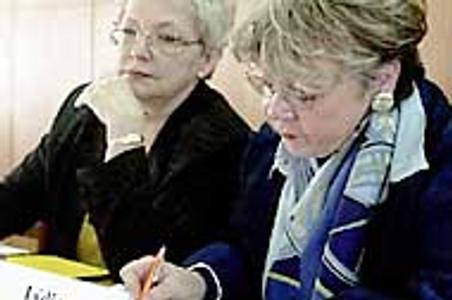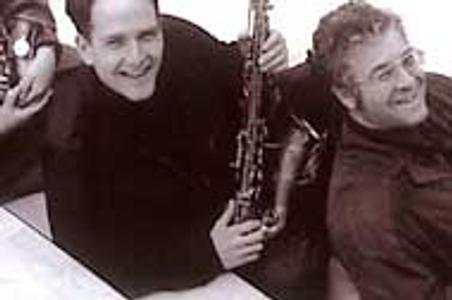Archive of articles - September 2002, page 4
If you desire to read an old article, use the search bar or select the publication date.
US tests diplomatic limits
A WESTERN diplomat on September 21 criticised the US administration's diplomatic drive to influence the possible makeup of the Slovak government ahead of weekend elections.Not only had the US said a return of former Slovak leader Vladimír Mečiar and his HZDS party to power could prevent the country from joining Nato in November, but US Ambassador to Slovakia Ronald Weiser also recently advised some government parties not to cooperate with the HZD splinter party of Mečiar defectors following elections.
How they voted: A diary of the election weekend
FRIDAYMAIN SQUARE, BRATISLAVA, 13:30- Seventy-year-old Helena Žiblitovská is selling wooden handicrafts at an open-air stall. She says the most important theme in the election campaign for her has been the moral decay of society. With polls to open in half an hour, she says she is still wavering between the governmental Christian Democrats (KDH) and the SDKÚ party of PM Mikuláš Dzurinda.
Around Slovakia
Longest beard hits 64 centimetresRottweiler brutally attacks mistressHigh-elevation phone booth a popular ringWar museum a regular target of thievesTime to break out the ProzacFloods destroy school canteenNikolka wants to live in an orphanageCockroach race sees eight insect athletesVoting in the darkSerial killer arrested
Elections 2002: A major turning point
THE RESULT of the September 20-21 elections - victory for a bloc of right-wing parties - showed that voters have developed an appetite for a more civilised, statesmanlike and Western-style brand of politics than Slovakia has known in its first decade of independence.This, more than anything else, is the 'meaning' of these elections. Offered authoritarian-style leaders, over three-quarters of voters rejected them. Instead, the electorate chose free market politicians who most closely resemble European Union leaders, despite the likelihood their reform policies will hurt living standards and unemployment in the short term.What voters were doing - and what they had never done before - was accepting that the painful transition from communism is going to take a little longer and hurt a little more than anyone could have believed in 1989. The nation's 'blbá nalada' [stupid mood, or unwarranted pessimism] that Dzurinda government politicians have complained of for four years has dissipated in a weary but clear-eyed acceptance of reality.
Generous cabinet fuels 7.2% real wage jump
Although real wage growth in Slovakia has reached its highest level for the last five years, analysts stress that the growth stems from government policy rather than greater labour productivity.The average nominal monthly wage reached Sk13,329 ($300) in the second quarter of 2002, a year-on-year increase of 10.5 per cent, while in real values wages grew by 7.2 per cent compared to the same period in 2001.
Where were the women?
AGRICULTURE Minister Pavol Koncoš, who said two years ago that "a woman, like a piece of land, belongs to the man who ploughs her", has been awarded a mock diploma by women's rights groups for "winning the hearts of Slovak women".The rights groups - the Choice Opportunity and Slovak Women's Alliance NGOs and the Aspekt feminist magazine - awarded Koncoš and the Christian Democrats political party for what they considered persistent anti-women positions during the Dzurinda government's four year reign.The NGOs said the gentler sex was thankful that especially Koncoš had tried to introduce order into their lives, as women secretly longed to be somebody's private property.
Top Pick: Saxophone to dominate festival slate
BELGIAN inventor Adolphe Sax dreamed of creating a musical instrument with the flexibility of the string family, the power of the brass, and the tone quality of the woodwinds. Around 1841 his tinkerings gave birth to what he dubbed immodestly the saxophone.Five years later he had patented an entire 'family' of saxophones. Among the later admirers of his genius were composers such as the Italian Gaetano Donizetti, the Hungarian Franz Liszt and the French Giacomo Meyerbeer.Despite the efforts of these artists, however, the saxophone's sharp and dominating voice still finds greater employment in small bands than in larger orchestras, mainly because orchestras put greater emphasis on the harmony of their parts.
- Top 10 events in Bratislava for foreigners
- Slovakia loses another EV model to Spain as Stellantis chooses Zaragoza over Trnava
- No more photos or bank statements? Slovakia moves to ease residence process
- Weekend: Celebration of fun comes to Malacky Photo
- News digest: Prosecutor seeks jail for NBS Governor Kažimír as his political support wanes
- Convicted of multiple murders, Slovakia’s mafia boss seeks release from prison
- Slovakia plans to restrict access to new medicines amid funding shortfall
- Slovak female triathlete shatters barriers with historic win at Himalayan event
- No more photos or bank statements? Slovakia moves to ease residence process
- Weekend: Celebration of fun comes to Malacky Photo
- Top 10 events in Bratislava for foreigners
- News digest: Fico’s bloc wants to save money by restricting electoral access
- Maria Theresa on the banks of Bratislava
- Slovakia loses another EV model to Spain as Stellantis chooses Zaragoza over Trnava
- 3 free things to do in Bratislava in the next seven days
- Slovakia plans to restrict access to new medicines amid funding shortfall
- Maria Theresa on the banks of Bratislava
- No more photos or bank statements? Slovakia moves to ease residence process
- News digest: Violent gang in Bratislava is under arrest
- 3 free things to do in Bratislava in the next seven days
- Weekend: Celebration of fun comes to Malacky Photo
- The Kremlin’s security agency has a Russian contractor in Slovakia - no one has noticed
- Top 10 events in Bratislava for foreigners
- Digital Jarvis is real now. He is coming for your to-do list
- Maria Theresa on the banks of Bratislava
- No more photos or bank statements? Slovakia moves to ease residence process
- Show me your moves! Slovak hockey stars share their best pick-up lines
- A mayor resigns over €2.7 million fraud scandal at town hall
- He designed Gatwick. But this is his masterpiece
- Fico praises China and Vietnam as models, says liberal democracy has failed
- News digest: Violent gang in Bratislava is under arrest
- The compass points to Kúty, and people are starting to follow
- News digest: Prosecutor seeks jail for NBS Governor Kažimír as his political support wanes
- Slovakia loses another EV model to Spain as Stellantis chooses Zaragoza over Trnava
- Slovak female triathlete shatters barriers with historic win at Himalayan event
- Weekend: Celebration of fun comes to Malacky Photo
- News digest: Fico’s bloc wants to save money by restricting electoral access
- Slovakia plans to restrict access to new medicines amid funding shortfall
- No more photos or bank statements? Slovakia moves to ease residence process
- Top 10 events in Bratislava for foreigners More articles ›






